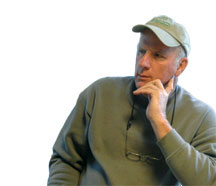This article appears in the November 2010 issue of Louisville Magazine. To subscribe, please visit loumag.com.
Way more than once during our long 2010 Summer of Discontent, grumpy people were heard making disparaging remarks about our Louisville TV meteorologists. As the days over 90 degrees piled up like flimflam at a political convention, as the promised and desperately needed rain went north and south or petered out somewhere near Santa Claus, Ind., I heard several otherwise rational people wonder out loud if all meteorologists wouldn’t be better off calling hog races for a living.
“How can they be so consistently wrong and show up for work the next morning so full of good cheer and acting as if they’d just had breakfast with Nostradamus?” asked one critic. “Don’t those people have any conscience, any soul — something alive and meaningful within them beyond TV ratings, professionally happy faces and selective memory?”
My theory is that a depressed-sounding meteorologist is about as useful as a stationary cold front. Yet the critic had even more venom: “One of the local stations even continually brags it offers the most accurate forecasts of all. Well, sure, compared to what?”
Bitter words, indeed, and mostly offered by those who too often have unexpectedly found themselves at the business end of a garden hose or snow shovel. And yet . . . who can remember all those boring accurate predictions?
Truth be told, I have numbered several meteorologists among my casual friends; have even shared bread and wine with them. All seemed sincere and dedicated professionals with well-tested senses of humor — even as my own basement would occasionally fill with three feet of partly cloudy.
So think about this: Meteorology is actually a brilliant occupational choice. Name one other job in which, no matter your track record, you get to re-establish credibility four times a year — spring, summer, fall and winter. You never get to do that if your steady work involves cliff-diving or dynamite.
I do, however, find the national Weather Channel folk — particularly those who drive madly across the Great Plains in pursuit of tornadoes — absolutely annoying. First there are their on-screen types: Hunky men and thrill-seeking women who wander the nation’s coasts to lean forward and babble into microphones as hurricane winds buffet their yellow slickers.
Come on — you’ve seen one hurricane, you’ve seen them all. Besides, none of that meteorological method acting is the equal to my hurricane bravado. During my sophomore year in college near the Gulf Coast, Hurricane Carla roared ashore with winds of about 140 miles an hour. Seeking some useful educational experience from all that meteorological Sturm und Drang, I attached a bedsheet to a laundry cart and was propelled down the street past our dorm at a considerable rate and for a considerable distance — and to considerable applause. I felt as fulfilled as Columbus; I never got that same feeling in any of my natural-science classes.
Unfortunately, it was that same 1961 hurricane that led to the hordes of ratings-crazed TV folk scrambling to water’s edge as a prelude to today’s storms — as I watch the media circus, I can almost see the intrepid reporters lined up side by side like dime-store fish bobbers in a raging creek. It was during Carla that the then little-known and continually unctuous Dan Rather reported its record-setting fury while standing on a Galveston, Texas, seawall — first opening the live-television floodgates to our contemporary weather theater.
So fast-forward to the modern tornado chasers, the rain-soaked cowboys and cowgirls gleefully chasing horrific tunnels of black wind as they destroy homes, lives and communities. One person’s high is another person’s flattened house; it’s a fine line between a folk hero and a fool.
Somewhere in the few thousand years between sacrificing virgins to see if the gods could scare up some rain and the slick, incessant — and totally addictive — presence of the 24-hour Weather Channel came other meteorological pioneers. Aristotle offered his sort-of-correct, if not static-electricity-free take on lightning about 2,200 years ago in his Meteorologica: “When there is a great quantity of exhalation and it is rare and is squeezed out in the cloud itself, we get a thunderbolt.”
Or the U.S. Congress.
Radio weather forecasting was first heard in Boston in 1925 — and seen on television in Cincinnati in 1940. WAVE-TV went on the air in Louisville in 1948 — the days of the grease pencil and Ouija board.
Meanwhile, many of us have resolutely stuck with The Old Farmer’s Almanac, the 218-year-old weather bible that, oops, predicted a “hot & wet” summer for us in 2010. Moving right along, the almanac specifically suggests this Nov. 17 as a good day to cut firewood, wax the floors, get married and castrate farm animals.
You never get that kind of advice from the Weather Channel.
Photo: Louisville Magazine



